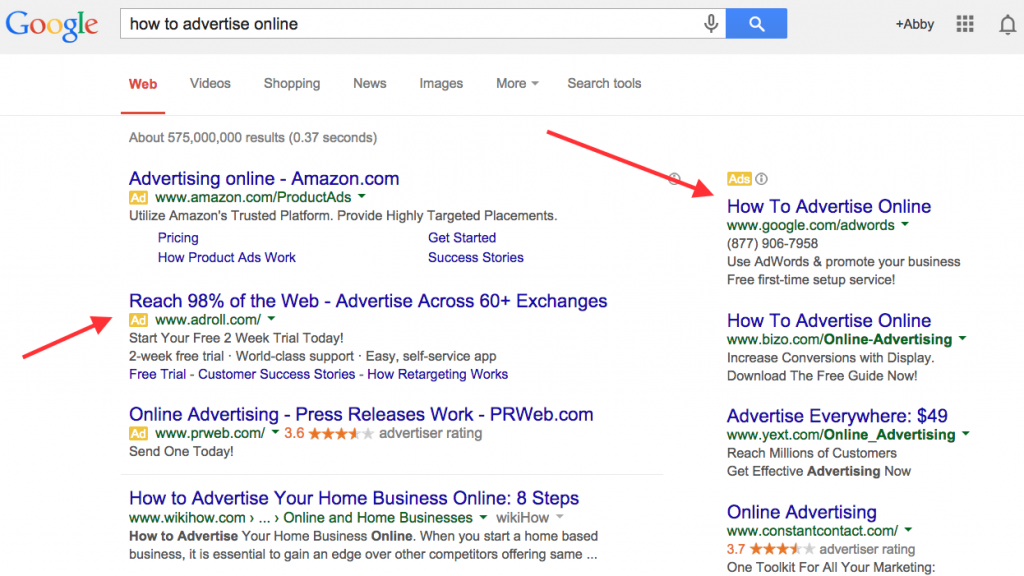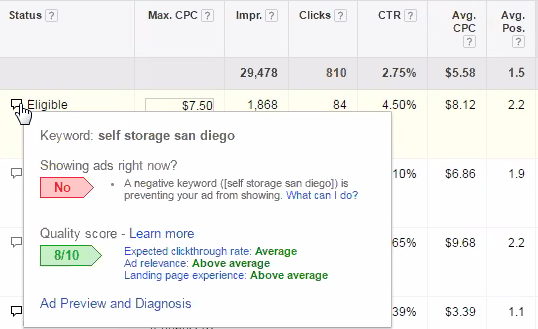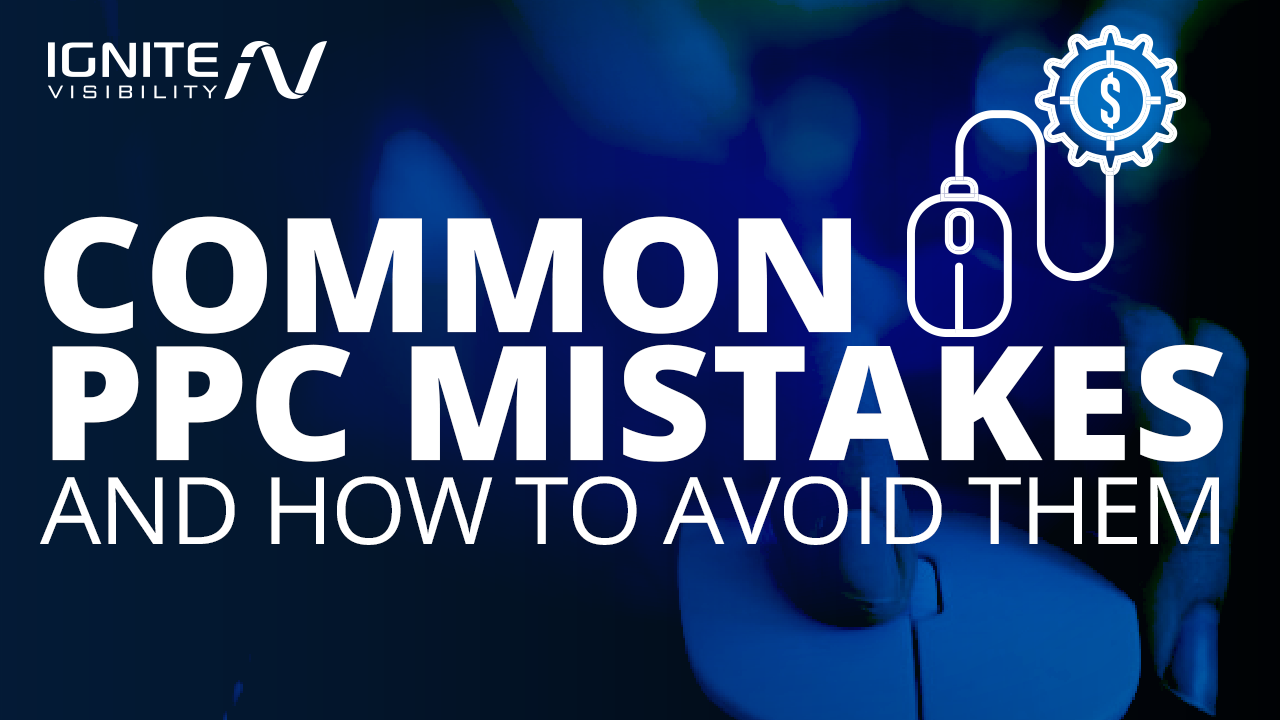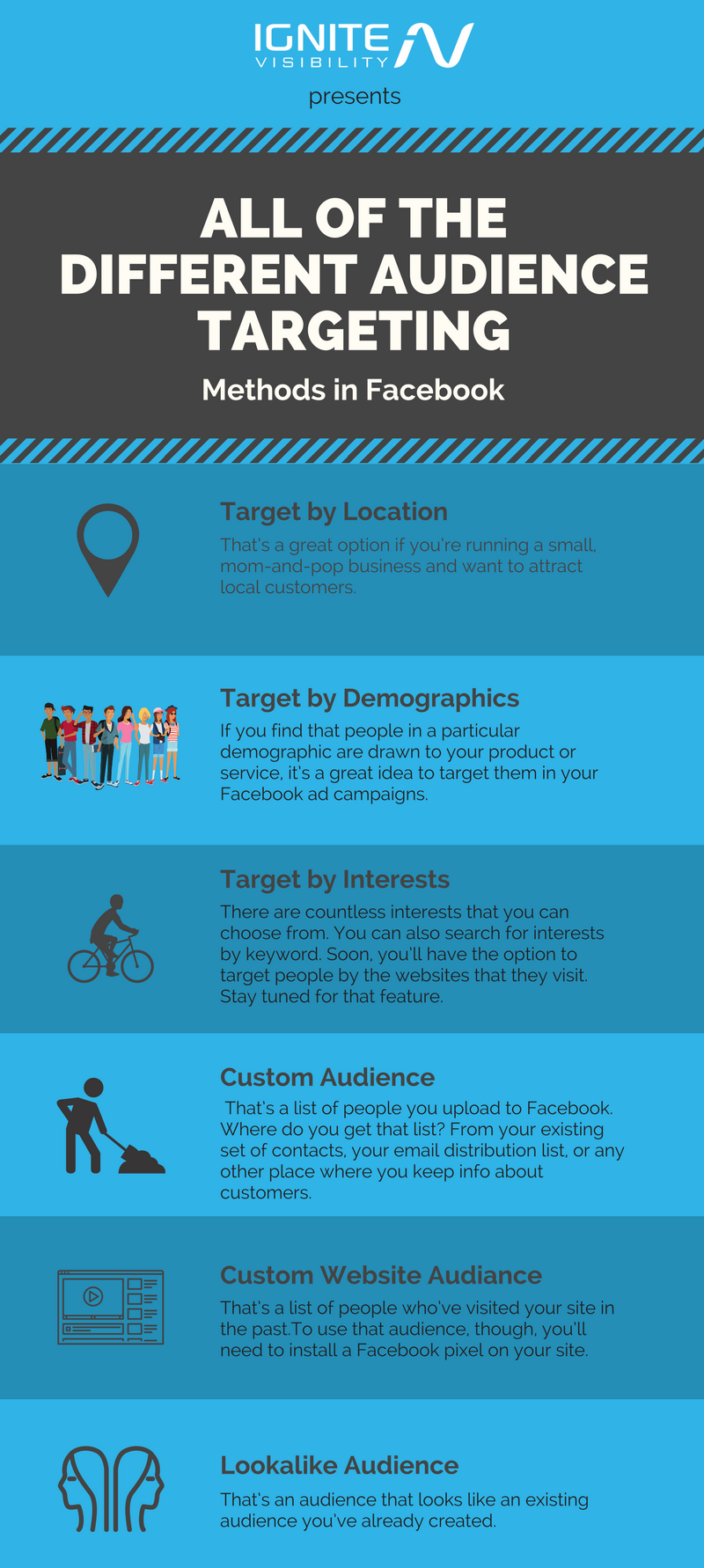Pay-per-click (PPC) is one of the most powerful digital marketing channels available today.
If you get it right, that is.
Below I’ll cover fourteen of the most common mistakes made in PPC campaigns, and how your business can avoid these pitfalls.
What We’ll Cover:
- Not understanding the different kinds of PPC campaigns
- Not having a clear strategy
- Not using audiences correctly
- Using broad match
- Not targeting your messaging
- Improper bidding
- Not running split tests
- Not using geo-targeting
- Not using long tail keywords
- Not paying attention to your quality score
- Ignoring seasonal copy
- Losing control of affiliates
- Using a phone number (instead of a call extensions)
- Not bidding on your name
What’s the Big Deal About PPC Campaigns?
First off, it offers the most bang for your buck.
Fact: Businesses make on average $3 in revenue for every $1.60 they spend on Google Ads.
And, it doesn’t come off as advertising to audiences (which is good because blatant advertising can often turn people off.)
Fact: Roughly half of all users did not recognize the difference between PPC and organic listings in the search results, according to a recent Wordstream study.
PPC Campaigns also perform much better than organic searches. So if you want to move up in the search rankings, PPC is your best b
Fact: Paid clicks outnumber organic clicks by 2 to 1.
Not only that, but they reach a very wide audience.
Fact: Google Ads display campaigns reach up to 80% of global internet users.
And, exposure to your ads increases a consumer’s likelihood of seeking out your brand.
Fact: Consumers exposed to display ads are, on average, 155% more likely to search for brand- and segment-specific terms.
So what does all this tell us? PPC ads are effective, reach a wide audience, and generate a large return on investment (ROI).
This means if you haven’t been using PPC campaigns, it’s time to start.
Most Common PPC Campaign Pitfalls (And How to Avoid Them)
1. Not Understanding the Different Kinds of PPC Campaigns
PPC isn’t a one-size fits all feature.
Which is a good thing. Different kinds of PPC campaigns are meant to accomplish different things. However, to ensure you make the best decision for your company, it’s important to study the differences between various ad types.
For example, with Google ads you have the option of Search ads or Display ads.

Search Dds outlined by left arrow, Display Ads on the right
Search ads show up directly in the SERPs (search engine result pages) when someone types a search query into Google. These are targeted directly at people looking for something related to your product and work best for the bottom of the sales funnel.
Display ads, on the other hand, show up on websites and are targeted by interest. Therefore, they’re best for top of the funnel, brand awareness PPC campaigns.
And that doesn’t even cover things like social ads.
How to avoid it: Familiarize yourself with the different ad types and which best align with your business goals.
Also, be sure to segment your audience. Often, you will use multiple ad types to target various groups within your audience.
2. Not Having a Clear PPC Campaign Strategy
I preach this all the time: good marketing starts with a solid PPC campaign strategy.
Before you start planning keywords, bid amounts, and creative content, you must have a clear idea of what you’re trying to accomplish.
This goes hand-in-hand with the previously mentioned point.
After all, how will you know what to write about if you don’t know who you’re writing for?
And how will you know which metrics to measure if you don’t have a clear idea of what you’re looking for?
How to avoid it: Do your homework. Really evaluate your business and what you need to achieve with these ads. Start with one PPC campaign.
For example, maybe your goal is to increase website traffic. Now, create a plan of action to make that happen.
3. Not Using Audiences Correctly in PPC Campaigns
The ability to zone into individual audiences is one of the greatest assets of PPC campaigns.
For example, on Facebook alone you have the option to target by location, demographics, interests, behavior on the web, as well as more advanced targeting features like remarketing (those who have visited your website in the past) and lookalike audiences (an audience similar to one you’ve already created).
Choosing the correct audience is (once again) tied directly to your goals.
So, if your goal is lead generation, you may want to gather your existing leads into a list and create a lookalike audience based on those who have proven interest in the products and services you are selling.
How to avoid it: Target carefully, and make sure your goals match that targeting.
4. Using Broad Match for in Your PPC Campaign
This isn’t always a major pitfall, but we see it misused more often than not.
Why? Because it can cost you lots of money without the return you’re looking for.
Broad match allows your keyword to match a very wide range of possible keywords.
You’ll notice as you set up your ads that this is the default option, and while it could lead you to more relevant keywords, it will inevitably produce unrelated keywords that you don’t need to be bidding on in your PPC campaign.
For example, if you target a broad term like “dress,” you could end up with broad matches like “wedding dress.” If you’re not in the wedding business, you likely don’t need to spend on that keyword.
How to avoid it: Use options like exact match or phrase match to more accurately target your keywords.
This will often mean choosing more than one match type. As always, be aware of what you’re trying to accomplish with your PPC campaign and the best option to help you reach that specific goal.
5. Not Targeting Your Messaging in PPC Campaigns
Of course, your messaging is the bread and butter of your ad.
If you’re using bland language and ok keywords, you can’t expect a big return.
The key to effective messaging? Using emotions to speak directly to your audience.
First, know exactly which audience you’re talking to. Maybe it’s a busy mom of three, or perhaps a serene Yoga instructor.
Next, determine your own persona. Are you authoritative? A comedian? The hero here to save the day?
Once you’ve decided those two things, you’ll have an idea of who you’re talking to and how you should talk to them. Then, you can work on incorporating emotion and urgency into your ad messaging (think headlines – what words will catch the most attention?)
How to avoid it: Follow the steps above. Know your audience and know your brand before diving off into the world of PPC campaigns.
6. Not Bidding Properly on Your PPC Campaign
PPC campaigns can get very expensive – fast.
Sure, you probably have a few big keywords that generate the most return. But focusing exclusively on those competitive keywords may prove more costly than you initially thought.
Worse, you may find that you’re getting the expected traffic but at an exorbitant price that your company is unable to maintain over the long run.
How to fix it: First and foremost, set a (realistic) budget for your campaign.
Then, focus on long-tail keywords. These generally cost less per click and can be more effective at targeting a specific audience.
7. Not Running Split Tests on PPC Campaign Ads
Testing is a must if you want to get the most bang for your buck.
Split testing allows you to test different ad features (creatives, audiences, match types, etc.) to see which is most effective for your brand.
Because the ads come with so many options, it’s increasingly important to experiment with different types of testing methods. After all, you may know in theory what should work, but you’ll never really know if it will actually work until you try it out.
How to avoid it: Run the tests. Thanks to new features like Google Experiments – which lets you test different PPC campaigns before pushing them live – split testing is easier than ever.
8. Not Using Geo-Targeting in Your PPC Campaign
Geographic targeting (or geo-targeting) lets you limit your target audience to a specific location. In fact, 36% of searches on Google are associated with a location.
If you’re a small or brick-and-mortar business, it’s especially important to drill down exact locations. If not, you could end up wasting money on clicks across the country that won’t generate any return.
How to avoid it: Pay attention to the location options in Google Ads and other PPC ads. Many of these are pretty standard; start by choosing the most relevant region to your physical location.
9. Not Using Long Tail Keywords in PPC Campaigns
Keywords are an undeniably crucial part of your PPC campaign, and choosing the right ones will ensure your ad shows up for the right people.
But many new to the world of PPC make the mistake of only focusing on short, broad keywords. While these will likely generate some return, they are generally more costly, competitive, and less specific to your intended audience.
Which is why we use long tail keywords for optimized PPC campaigns.
Long tail keywords are search phrases. So, a broad keyword may be “jeans,” while a long tail would be “best jeans store in Nashville, TN.”
It may not get the volume of the broad keyword, but it will have the most relevance to your target audience and target those looking specifically for your product.
How to avoid it: Make a list of questions your ideal customer might type into Google. These are what your long tail keywords should look like.
Here are a few more tips on finding long tail keywords for your PPC campaign:
- Use Google Suggest. You’ve probably used Google Suggest even if you don’t know it. Often times, when you start typing a phrase into the search bar, Google will “guess” at what you’re looing for and autocomplete the phrase. Use that autocomplete to harvest some great long tail keyword ideas.
- Check out Related Searches. When you view search results on Google, you’ll almost always see a “related searches” section at the bottom of the first page. Take a look at some of those related searches to get even more ideas about long tail keywords. Even better: click on some of the related searches and view the related searches in those search results. Rinse and repeat.
- Use More Than One Keyword Research Tool. Not all keyword research tools are created equal. You might find some great ideas in one tool that aren’t suggested in the other. And yes, using more than one tool means you’ll have to spend more money. But it’s a wise investment if you attract more people to your ads.
- Search Question & Answer Sites. Remember: many of the best long tail keywords are presented in the form of a question. That’s why you can likely find plenty of great ideas by browsing through Q&A websites such as Quora.
- Browse Wikipedia. Search for key concepts in Wikipedia, then, view the table of contents for each of the concepts. You’ll notice that each entry in the TOC is a word or phrase. Some of those entries might make great candidates for long tail keywords.
10. Not Paying Attention to Your Quality Score
Your quality score is assigned by Google, based on the quality of your ads and keywords.
It’s affected by multiple factors, including the following:
- Your CTR (click-through-rate)
- Your Google Ads performance over time
- Relevance of your keywords
- Etc.
The higher your quality score, the less you’ll pay per click and the higher your ad will rank. Pretty nice pay-off, right?
Yes, as long as you monitor it.

Improve your quality score for better PPC Campaigns
How to avoid it: You can find your quality score in your Google Ads account and improve it if less than desirable.
For example, try improving your CTR by adding calls-to-action or work on your keyword research to improve the relevancy of your keywords.
11. Ignoring Seasonal Copy in Your PPC Campaign
Holiday specials have a proven track record of paying off.
Keeping up with seasonal holidays such as Christmas, Halloween, and Valentine’s Day can really help you generate revenue.
Using a PPC campaign to promote a seasonal sale or discount will make your customers very happy and will draw in new customers. Everyone loves a sale.
How to avoid it: Mark your calendar. Keep track of the seasonal holidays and offer great deals to your target audience when the time is right.
12. Losing Control of Affiliates During a PPC Campaign
If you choose to work with affiliates, they might be using your brand name as a keyword to earn some extra cash.
This is not good for you financially since you have already paid for those keywords in your own PPC campaign, plus you are paying the affiliate for each sale they make.
How to avoid it: Get control of your affiliates. When you strike a deal with them, be sure to make a point to restrict them from using your brand as a keyword in their own advertising efforts.
13. Using a Phone Number in a PPC Campaign
Displaying a phone number on your PPC campaign is only good for one thing. It looks nice.
However, the likelihood of a potential customer dialing your phone number is slim.
All you are doing is wasting precious advertising space that could be better put to use with an effective message.
How to avoid it: Don’t put your phone number on PPC campaigns. That’s a simple way to avoid this common pitfall.
However, you can implement click-to-call through call extensions, which allow users to easily click on a number to be connected.
14. Not Bidding on Your Name
Placing bids on your own brand name as a keyword can be very beneficial. It can lead to an increase in traffic to your website and generate a higher conversion rate.
If you’re not bidding on your own name, then you’re missing out. You might even be allowing your competitors to bid on your brand-specific keywords. (If this is the case, you can take legal action to stop them.)
How to avoid it: Bid on your brand name. It will help carve out another real estate space for you in the online realm. It will also give you more legal authority if you happen to find that competitors are capitalizing on your brand name.
Wrapping Up PPC Campaigns
There are many factors that go into a successful PPC campaign.
And with so many options out there, you’re bound to come across a few pitfalls.
But by being aware of the common mistakes listed above, you can get ahead of the game and pave the way for a successful PPC campaign.



